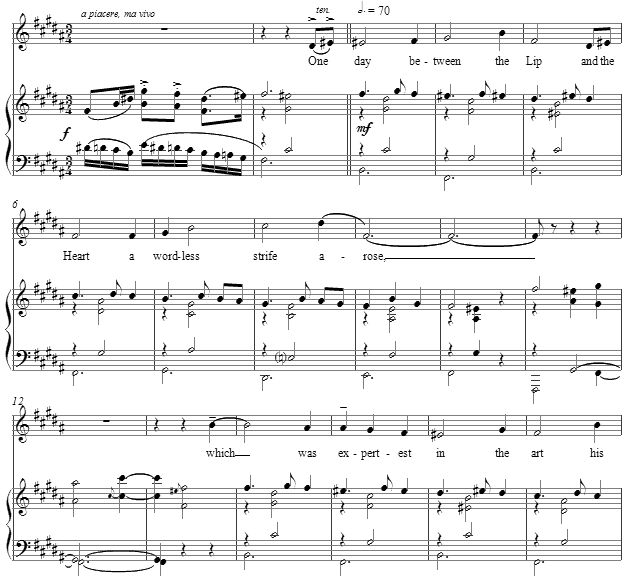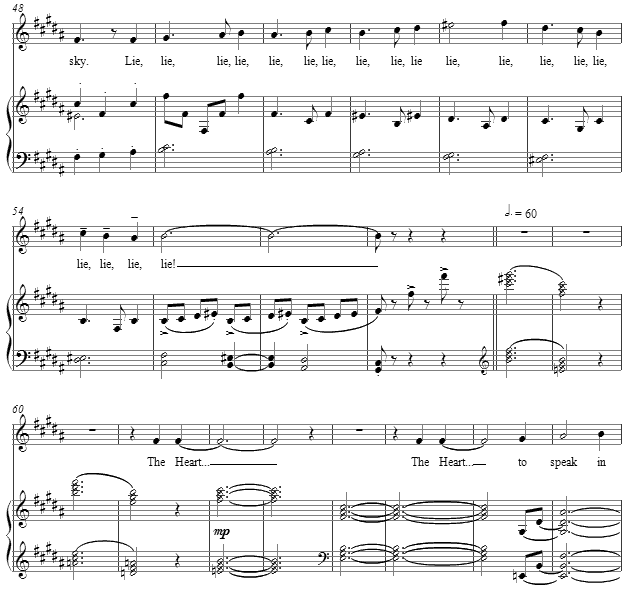Music and Texts of GARY BACHLUND
Vocal Music | Piano | Organ | Chamber Music | Orchestral | Articles and Commentary | Poems and Stories | Miscellany | FAQs
The Lip and the Heart - (2007)
John Quincy Adams
for medium voice and piano
One day between the Lip and the Heart
A wordless strife arose,
Which was expertest in the art
His purpose to disclose.
The Lip called forth the vassal Tongue,
And made him vouch—a lie!
The slave his servile anthem sung,
And braved the listening sky.
The Heart to speak in vain essayed,
Nor could his purpose reach—
His will nor voice nor tongue obeyed,
His silence was his speech.
Mark thou their difference, child of earth!
While each performs his part,
Not all the lip can speak is worth
The silence of the heart.[ 5 pages, circa 2' 00" ]
John Quincy Adams (1767-1848)
The first President who was the son of a President, John Quincy Adams in many respects paralleled the career as well as the temperament and viewpoints of his illustrious father. Born in Braintree, Massachusetts, in 1767, he watched the Battle of Bunker Hill from the top of Penn's Hill above the family farm. As secretary to his father in Europe, he became an accomplished linguist and assiduous diarist. After graduating from Harvard College, he became a lawyer. At age 26 he was appointed Minister to the Netherlands, then promoted to the Berlin Legation. In 1802 he was elected to the United States Senate. Six years later President Madison appointed him Minister to Russia. Serving under President Monroe, Adams was one of America's great Secretaries of State, arranging with England for the joint occupation of the Oregon country, obtaining from Spain the cession of the Floridas, and formulating with the President the Monroe Doctrine.
In the political tradition of the early 19th century, Adams as Secretary of State was considered the political heir to the Presidency. But the old ways of choosing a President were giving way in 1824 before the clamor for a popular choice. Within the one and only party--the Republican--sectionalism and factionalism were developing, and each section put up its own candidate for the Presidency. Adams, the candidate of the North, fell behind Gen. Andrew Jackson in both popular and electoral votes, but received more than William H. Crawford and Henry Clay. Since no candidate had a majority of electoral votes, the election was decided among the top three by the House of Representatives. Clay, who favored a program similar to that of Adams, threw his crucial support in the House to the New Englander.
Upon becoming President, Adams appointed Clay as Secretary of State. Jackson and his angry followers charged that a "corrupt bargain" had taken place and immediately began their campaign to wrest the Presidency from Adams in 1828. Well aware that he would face hostility in Congress, Adams nevertheless proclaimed in his first Annual Message a spectacular national program. He proposed that the Federal Government bring the sections together with a network of highways and canals, and that it develop and conserve the public domain, using funds from the sale of public lands. In 1828, he broke ground for the 185-mile C & 0 Canal. Adams also urged the United States to take a lead in the development of the arts and sciences through the establishment of a national university, the financing of scientific expeditions, and the erection of an observatory. His critics declared such measures transcended constitutional limitations.
Given the argument between the word -- by which man can form a lie as easily as a truth -- and the heart, Adams reminds us that the "silence of the heart" speaks volumes to each of us, which words themselves can only attempt to near. A lie in words is an easy thing, and when a politician reminds us of this, it is advice worth noting. As through the cautioning of other great thinkers, we are also reminded that freedom comes through truth, while enslavement comes easily with the lie.
The dissonance of the lie is hinted at through the inconsistent raised fourth of the scale, sometimes functional and sometimes not.
To emphasize and have fun with the word, "lie," it is repeated in this setting playfully. How often do we think we can get away with a lie? More often than we care to admit to ourselves, Adams reminds us. After this playful moment passes, the sweeter and more somber reality of the "silence of the heart" takes it rightful place to make more serious and pointed this observation.
The score is available as a free PDF download, though any major commercial performance or recording of the work is prohibited without prior arrangement with the composer. Click on the graphic below for this piano-vocal score.


